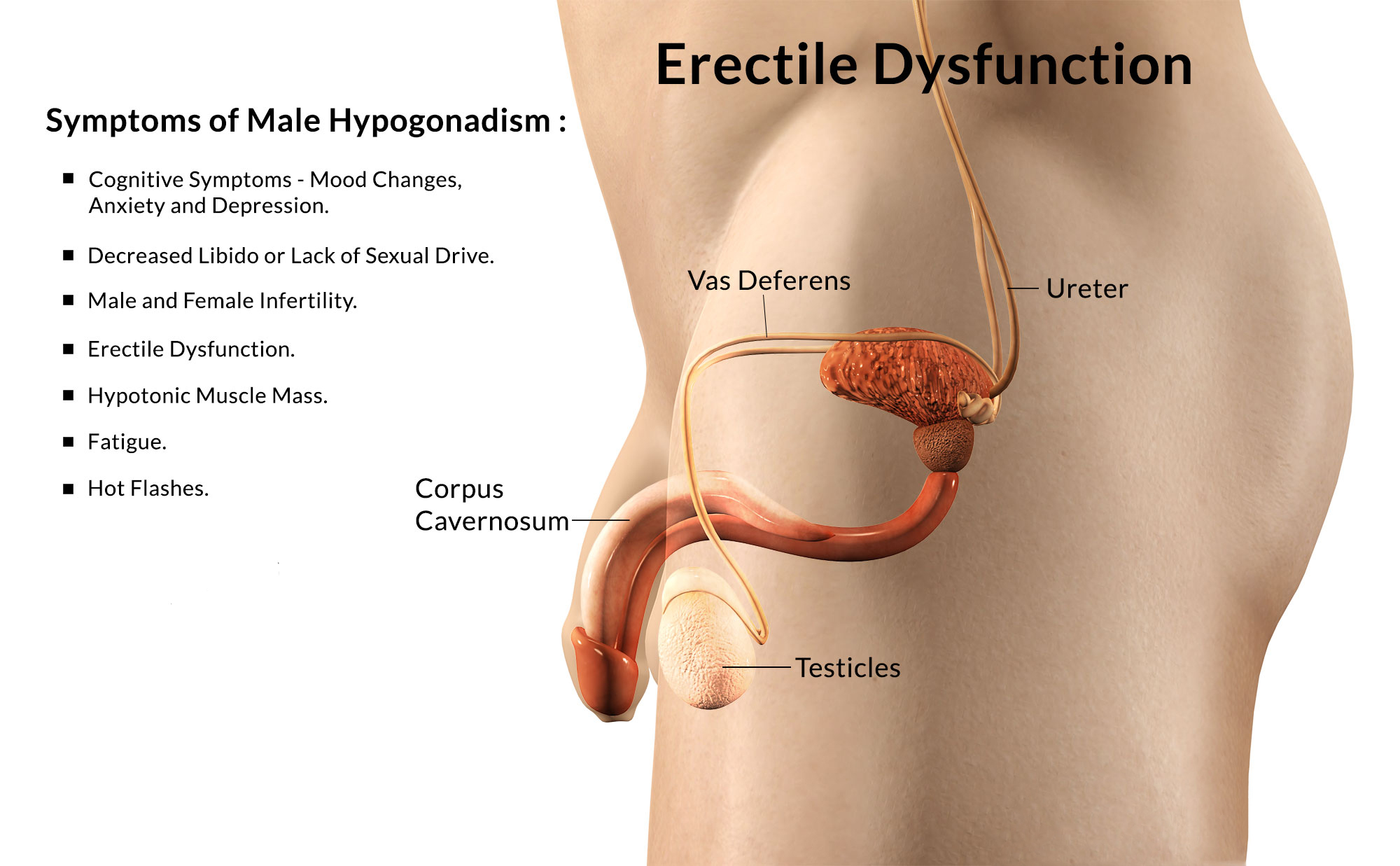An overview of Erectile Dysfunction
What is Erectile Dysfunction?
Erectile dysfunction (ED) is the inability to get and keep an erection firm enoughfor sexual intercourse. Estimates suggest that one of every 10 men will suffer fromED at some point during his lifetime. It is important to understand that in mostcases, ED is a symptom of another, underlying problem.

What causes erectile dysfunction (ED)?
ED can be caused by a number of factors, including:
Vascular disease : Blood supply to the penis can become blocked or narrowed asa result of vascular disease such as atherosclerosis (hardening of the arteries).
Neurological disorders (such as multiple sclerosis) : Nerves that sendimpulses to the penis can become damaged from stroke, diabetes, or other causes.
Psychological states : These include stress, depression, lack of stimulus fromthe brain and performance anxiety.
Trauma : An injury could contribute to symptoms of ED.
Signs and symptoms of Erectile dysfunction
Trouble getting an erection
Trouble keeping an erection
Reduced sexual desire
Can erectile dysfunction (ED) be prevented?
For people who are at risk of developing ED due to personal behavior, steps may betaken to try to prevent its occurrence. However, other causes may not bepreventable.
A number of studies now suggest a link between ED and obesity, high cholesterol,hypertension, diabetes and heart disease.
The following recommendations may help prevent ED or improve the problem if it isalready present:
1. Eat a healthy diet. A diet that limits saturated fat intake and includes severalportions of fruits, vegetables and whole grains can benefit men with ED.
2. Reduce cholesterol. High cholesterol can harden, narrow or block the arteries(atherosclerosis) leading to the penis. Men can lower cholesterol through diet,exercise and medication.
3. Maintain a healthy weight.
4. Exercise regularly. Regular exercise may reduce the risk of ED. Choose exercisesthat you enjoy and will make a regular part of your day. In addition to reducing therisk of ED, exercise also can help you manage stress. Check with your doctor beforestarting any exercise program.
How is erectile dysfunction (ED) diagnosed?
Because there are a variety of causes for ED, there are several different tests yourdoctor may use to diagnose the condition and determine its cause. Only after thecause of ED is determined can it be effectively treated.
Before ordering any tests, your doctor will review your medical history and perform athorough physical examination. The doctor will also "interview" you about yourpersonal and sexual history. Some of these questions will be very personal and mayfeel intrusive. However, it is important that you answer these questions honestly.
How is erectile dysfunction treated?
The type of medical specialist who treats ED will depend on the cause of the problem.Based on your family's medical history, as well as your own medical history andcurrent health, your doctor may treat you with oral medications (Viagra®, Levitra®,Cialis®).
If these options fail, you may be referred to a urologist who can assist with othernon-surgical options such as vacuum device or injections or surgical treatmentoptions. If needed, your doctor may also refer you to a psychologist specializing insexual dysfunction.
ED can be treated in many ways, including:
1. Oral medications.
2. Sex therapy.
3. Penile injections.
4. Vacuum devices.
5. Intraurethral medication.
6. Surgery (penile implant).
Frequently Asked Questions About erectile dysfunction
For some men, depression can accompany the conditionof erectile dysfunction (ED). It is common for men with ED tofeel angry, frustrated, sad, unsure of themselves, or even less“manly.” Such feelings may lead to a lack of self-esteem and, insevere cases, to depression.
If you suspect you have erectile dysfunction, pleasesee your primary care physician or a urologist. He or she canperform tests to find out what is causing your problem and referyou to a specialist if needed. Once the cause is identified,there are several treatment options to choose from.
Approximately one in 10 adult males will suffer fromED on a long-term basis.
Insurance coverage for ED depends on the type oftreatment prescribed and whether your insurance covers sexualdysfunction at all. Speak with your insurance provider todetermine if the option you are considering will be covered.